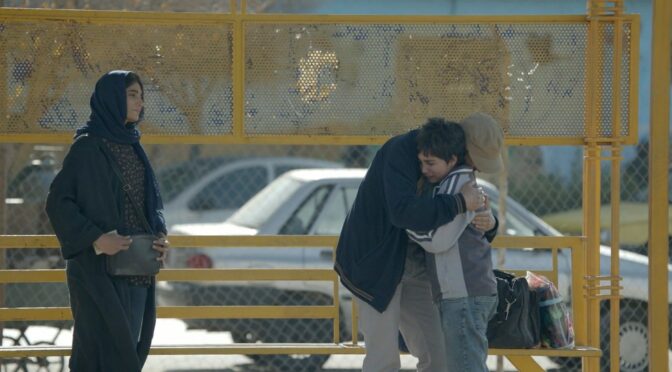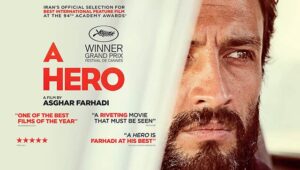The ascendance of Persian writer-director Asghar Farhadi over the last ten years, from hot upstart to reliable Oscar contender (he has two gold men for Foreign Language Film already) has been so steady that it almost feels like we cinephiles may already take him for granted. By the time he was accepting his second Academy Award for The Salesman in 2016, you could detect a whiff of the inevitable and the unhip to it; the sense that the Oscars were now just fully in the tank for Farhadi. As if he were Ron Howard, as opposed to one of cinema’s most exciting and consistently thoughtful chroniclers of human nature. We have the luxury of living in a world where an Asghar Farhadi film is a presumable Oscar heatseeker and, predictability aside, we’re all much the better for it. And, if there is a reason why a director with the prickly, nuanced humanism of a Persian Kenneth Lonergan has been so readily embraced even by the rarely prickly Oscars, it’s that there is something kind of undeniable about his films. You can feel it when you watch one. There is just something intuitively powerful and right about how candidly and potently he captures living, breathing human beings. Anecdotally, I remember speaking to a handful of friends in 2011, not long after A Separation had come out, and being quietly floored to find that they had sought out the film. None of them were what I’d call ravenous arthouse fans and I was rather surprised that an intricately plotted, densely verbal Iranian divorce drama had found its way to them. Not only had they seen it, they were ecstatic and effusive about it. And when I went to rewatch it, it made sense why they would be. Yes, the film was difficult in its subject matter and the simmering intensity of the characters’ plights, but the stuff of classic, old-school drama was right there on the screen. When you watch an Asghar Farhadi film unfold (and few directors working today are better at painstakingly unfolding a story), you get that know-it-when-you-see-it tingle. They required a modicum of patience, but they reward that patience with stories of human miscommunication and striving and faltering and trying to do better that just connect. They tap into something universal and relatable. I think what is spell-binding is how Asghar Farhadi can take stories happening in the very specific cultural and political environment of modern Iran, posit very pointed insights about Persian society, and also transcend that cultural setting to find themes that are powerful and timeless.
Before A Hero‘s poignant and eloquent themes have been unpacked, however, Asghar Farhadi is already doing what he may do better than anyone working: building himself a beautiful plot. The triumph of the film is in how it weaves together an intricate pattern of human actions and consequences that organically feed off one another in ways that feel honest and believable. This plot concerns Rahim (phenomenally played by Amir Jadidi), a recently divorced single father in the city of Shiraz. Rahim has just been released from debtor’s prison for a weekend furlough. While out, he has grand plans to make good with the man who had him jailed, a creditor who he owes 75,000 rial. His idea is to sell some gold coins that his girlfriend discovered at a bus stop to pay off all of his debt. However, a calculation issue at the local pawn shop leads Rahim to realize that he will not be able to pay his bitter debtholder back entirely. Instead, he decides to take the road of piety and leaves the coins with the police in hopes that they can be returned to the person who misplaced them. Instead of leaving his cell phone as a contact number, he leaves the number of his prison. As a result, when the coins are recovered (by a grateful woman who had hoped to use them to gain some financial independence from her domineering husband), news of Rahim’s good deed ends up reaching the prison. The warden and staff are all quite inspired by Rahim’s virtuous act, particularly because Rahim could have used the coins to help repay part of his debt. The prison, which has its own public relations reasons for wanting to publicize Rahim’s kindness, calls a news affiliate to report on the story and Rahim suddenly finds himself out of jail and embraced as a national celebrity. A charity is collecting to help pay the rest of his debt, a cushy government job offer is in the works, his concerned sister and brother-in-law have regained respect for him, and he seems to be in the good graces of just about every man, woman and child in Iran. One notable exception is Bahram (an excellent Mohsen Tanabandeh), the man he owes the money to and also brother to Rahim’s ex-wife. This stern man is openly suspicious that Rahim is not acting openly. It’s partly the byproduct of their soured business relationship (the opportunity went under, though Rahim insists he was not at fault) and Bahram’s feelings of vicarious resentment on behalf of his sister. But we sense that, his temper and bias against Rahim aside, Bahram is not entirely wrong in his skepticism. Farhadi films are patient and unfailingly observant; they do not tune any information out, regardless of which character is presenting it. A formulaically plotted version of this story might posit Bahram as nothing more than an antagonistic obstacle to Rahim’s freedom, but A Hero chafes against the unfairness of that notion. After all, Bahram may look like the ill-tempered creditor, but wasn’t he originally just a generous man who took on debt to help his former brother-in-law and then suffered for it when everything fell apart? Farhadi films remind us that the dramatic notion of a single protagonist is something of a deception because everyone is the protagonist of their own story. If you’ve seen one of Farhadi’s marvelous films, you know that any clear-cut idea of heroes and villains has no place in them. Any bold lines between characters we are meant to sympathize with and ones we are meant to resent are bound to get blurred in short order.


And, while Farhadi is gradually allowing flecks of mud to spatter onto Rahim’s saintly Samaritan story, he is also adding nuanced plot complications. While Rahim has most of the money he needs to settle his debt, he will still need the job the charity is setting him up with to make the last of the payments. But when the hiring manager asks to cross-check Rahim’s story with the woman he allegedly returned the gold to, the narrative starts to fray. Because Rahim wasn’t the one to meet the woman (his sister met her along with Rahim’s developmentally disabled son), and the woman left no telephone number, which of course could look suspicious. Maybe she did that for her own secrecy (we know that she feared her husband finding out about the coins) or maybe Rahim put together an act of kindness to repair his own sullied reputation. And now maybe Rahim’s decision to have the woman call the prison looks a little more like a calculated act of grandstanding for his own gain. And while this detailed array of moving parts is coming together, at first to our protagonist’s benefit and then just as quickly against him, Farhadi’s characters are making mistakes. As people do. Mistrusting each other and accusing each other and getting in their own way. The wonder of an elaborate Farhadi plot is that there is never a feeling of contrivance. It’s all the seemingly natural result of fallible human behavior; sometimes well-intentioned, sometimes borne of petty emotions, but always recognizably human. It is a talent I stand utterly in awe of. The ability to turn the wheel of plot effortlessly so that one decision seamlessly brings us to the next, and yet to be in control of that seemingly invisible process. To make it seem like your film is off-roading away from any kind of pre-scripted path and then to arrive somewhere so powerful and revealing that you can’t help wondering if the writer really did end up right where they intended to go after all.
It’s not just A Hero‘s eventual resolution, both sweetly tender and heartbreakingly tough, that resonates. As the sleek engine of its script design purrs along through each bracing twist and turn, Farhadi finds windows into humanity and psychology and morality the whole way. Among other things, A Hero is one of the greatest films I’ve seen about overnight celebrity and the social media age. Think of how leadenly and obviously a great many films have tried to shoehorn Facebook and Twitter into their plots over the years (look at Don’t Look Up‘s inscrutable, cursed boomer mishmash of Internet montages for the latest example) and then marvel not only at how organically the phenomena of tweets and viral videos shape A Hero‘s plot, but also how much of the viral age is at the core of what Farhadi’s film is grasping toward. Namely, Farhadi wants to examine the way we rush to adjust our perceptions of a person’s character in response to a constant, often contradictory torrent of information. Even the film’s simple title, A Hero, feels like a sardonic smirk at the fallacy of trying to categorize things too neatly. It’s a dunk on the fallacy that complex human beings can be cleanly grouped under simple archetypes. As uncharitable as he seems, Bahran is right about one thing: Rahim’s overnight development into a national good guy inevitably paints Bahran as the miserly asshole. And neither label comes close to telling the real story of who they are. The film sees in social media not just new ways of processing facts and stories but the prevalence of some ancient human habits, like vanity and the need to sculpt a public-facing image for ourselves. To design a version of ourselves that others can accept and that we can life with. Rahim, the prison, and even the charity are all forced to grapple with the omnipresence of social media and all of their decisions and conundrums are the product of living in an age where our decisions reverberate far beyond their immediate effects. Every self-benefiting choice that a character wants to present as completely noble has its layers of self-interest stripped bare and revealed. And even those choices that may have been done without selfish reasoning have their purity called into question. It is the inherent result of living in a world so public that scrutiny is widespread and so interconnected that our actions cannot help but collide and commingle with the actions of others. And the collision of human behavior may be the most Farhadian theme there is.
That sense of the epic tangle of humanity is what allows Asghar Farhadi to sculpt this explicitly 21st century parable into something that could also feel at home in the plays of Chekov or on some ancient Greek stage. There is a curious scene in the opening minutes of A Hero, just after Rahim has been temporarily released. He goes to visit his brother-in-law at work to propose the idea of paying off his debt. His brother-in-law happens to do archaeological preservation at an ancient tomb, the massive and awe-inspiring Naqsh-e Rostam. His current place of work happens to be some hundred feet above the ground and Rahim must makes his way up a wooden scaffold erected against the wall of this lofty historical wonder. This ancient site doesn’t affect the rest of the film in any way. Rahim’s brother-in-law could just as easily have worked in an office park or a laboratory or a school. But Asghar Farhadi chooses to set this scene here, to include this ancient glimpse of a civilization long past. This has the effect of making us think of all the people who were here before. People who occupied this same city, same ground and same space for centuries and centuries before the characters of A Hero were even born. And it made me reflect on how some of those ancient humans might well have had stories fundamentally similar to Rahim’s. People in jail. Someone who can’t catch up with her debts. A man trying to patch together his broken reputation. A Samaritan. A saint. A con man. Walking the streets of Shiraz separate from each other or all inside the heart of a single citizen. That briefly glimpsed, seemingly extraneous tomb may be Asghar Farhadi calling his shot. He’s telling us that he is striving to make something that is timeless, its deep themes so rooted in the human condition as to be transplantable to any age in human history. Maybe I’m being hyperbolic by saying you could reimagine a Farhadi drama at any point in human history, the same way people do with Shakespearean plays. But also, maybe the comparison is not an undeserving one. Both can be simultaneously true. Asghar Farhadi would certainly approve of that notion.
After all its moral complexities have been meditated on and chewed over, what lies at the heart of A Hero is a story about the difficulty of trying to do the right thing. One of the oldest metaphors for a life lived virtuously is the straight and narrow path, but Farhadi’s films critique that image. In Farhadi’s rich, multi-faceted moral universes, the right thing seems much less straightforward. In A Hero‘s first act, Rahim thinks he has found an easy way to free himself from jail; a way to start a new life with his loving girlfriend and to reunited with his son. What his ordeal teaches him, in ways both harsh and true, is that the truly virtuous path takes a lot of discipline and self-sacrifice. It will likely mean that Rahim cannot have the freedom he thought he was so close to gaining just yet. To many eyes, the ending of A Hero might feel merciless, but I also found a small sliver of hope to it. Rahim does end the film in a better place, even if it is not as ideal a position as the one he thought he could maneuver his way into. But he does have people who love him and he finds a new sense of ownership over his own past mistakes and the ways that he can do better in the future. And there is a kind of freedom in that realization that we can only hope will sustain him until he finds the more overt, physical freedom that he wants. The pathway to redemption he thought he had found may have been a mirage. But that does not mean that the real pathway to a better life does not exist.










